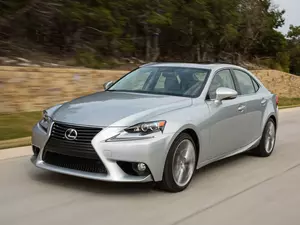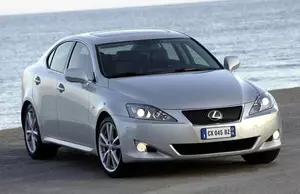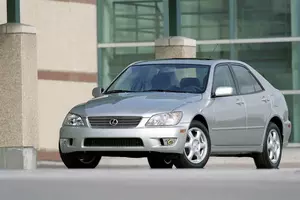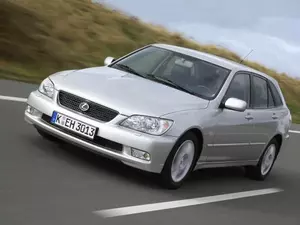
| Vehicle | Precise engine size | Difference from world average | Engine size to consumption ratio | Horsepower from 1 L | Engine size to 100 kg of weight |
|---|---|---|---|---|---|
| 300h |
2.5 L (2500 cc) |
6.6% bigger | 49 cc to 1 mpg | 72 hp from 1 L | 156 cc to 100 kg |
| 350 V6 |
3.46 L (3456 cc) |
47.3% bigger | 182 cc to 1 mpg | 90 hp from 1 L | 216 cc to 100 kg |
| 300 |
2 L (1998 cc) |
14.8% smaller | 91 cc to 1 mpg | 121 hp from 1 L | 125 cc to 100 kg |
| 300 V6 |
3.46 L (3456 cc) |
47.3% bigger | 192 cc to 1 mpg | 75 hp from 1 L | 203 cc to 100 kg |
| Vehicle | 300h |
|---|---|
| Precise engine size | 2.5 L (2500 cc) |
| Difference from world average | 6.6 bigger |
| Engine size to consumption ratio | 49 cc to 1 mpg |
| Horsepower from 1 L | 72 hp from 1 L |
| Engine size to 100 kg of weight | 156 cc to 100 kg |
| Vehicle | 350 V6 |
| Precise engine size | 3.46 L (3456 cc) |
| Difference from world average | 47.3 bigger |
| Engine size to consumption ratio | 182 cc to 1 mpg |
| Horsepower from 1 L | 90 hp from 1 L |
| Engine size to 100 kg of weight | 216 cc to 100 kg |
| Vehicle | 300 |
| Precise engine size | 2 L (1998 cc) |
| Difference from world average | 14.8 smaller |
| Engine size to consumption ratio | 91 cc to 1 mpg |
| Horsepower from 1 L | 121 hp from 1 L |
| Engine size to 100 kg of weight | 125 cc to 100 kg |
| Vehicle | 300 V6 |
| Precise engine size | 3.46 L (3456 cc) |
| Difference from world average | 47.3 bigger |
| Engine size to consumption ratio | 192 cc to 1 mpg |
| Horsepower from 1 L | 75 hp from 1 L |
| Engine size to 100 kg of weight | 203 cc to 100 kg |

| Vehicle | Precise engine size | Difference from world average | Engine size to consumption ratio | Horsepower from 1 L | Engine size to 100 kg of weight |
|---|---|---|---|---|---|
| 250 |
2.5 L (2500 cc) |
6.6% bigger | 93 cc to 1 mpg | 83 hp from 1 L | 156 cc to 100 kg |
| 300h |
2.49 L (2494 cc) |
6.3% bigger | 45 cc to 1 mpg | 73 hp from 1 L | 147 cc to 100 kg |
| 200t |
2 L (1998 cc) |
14.8% smaller | 59 cc to 1 mpg | 123 hp from 1 L | 118 cc to 100 kg |
| Vehicle | 250 |
|---|---|
| Precise engine size | 2.5 L (2500 cc) |
| Difference from world average | 6.6 bigger |
| Engine size to consumption ratio | 93 cc to 1 mpg |
| Horsepower from 1 L | 83 hp from 1 L |
| Engine size to 100 kg of weight | 156 cc to 100 kg |
| Vehicle | 300h |
| Precise engine size | 2.49 L (2494 cc) |
| Difference from world average | 6.3 bigger |
| Engine size to consumption ratio | 45 cc to 1 mpg |
| Horsepower from 1 L | 73 hp from 1 L |
| Engine size to 100 kg of weight | 147 cc to 100 kg |
| Vehicle | 200t |
| Precise engine size | 2 L (1998 cc) |
| Difference from world average | 14.8 smaller |
| Engine size to consumption ratio | 59 cc to 1 mpg |
| Horsepower from 1 L | 123 hp from 1 L |
| Engine size to 100 kg of weight | 118 cc to 100 kg |

| Vehicle | Precise engine size | Difference from world average | Engine size to consumption ratio | Horsepower from 1 L | Engine size to 100 kg of weight |
|---|---|---|---|---|---|
| 5.0 V8 |
4.97 L (4969 cc) |
111.8% bigger | - | 85 hp from 1 L | 292 cc to 100 kg |
| Vehicle | 5.0 V8 |
|---|---|
| Precise engine size | 4.97 L (4969 cc) |
| Difference from world average | 111.8 bigger |
| Engine size to consumption ratio | - |
| Horsepower from 1 L | 85 hp from 1 L |
| Engine size to 100 kg of weight | 292 cc to 100 kg |

| Vehicle | Precise engine size | Difference from world average | Engine size to consumption ratio | Horsepower from 1 L | Engine size to 100 kg of weight |
|---|---|---|---|---|---|
| 250C AWD |
2.5 L (2499 cc) |
6.5% bigger | 100 cc to 1 mpg | 83 hp from 1 L | 139 cc to 100 kg |
| Vehicle | 250C AWD |
|---|---|
| Precise engine size | 2.5 L (2499 cc) |
| Difference from world average | 6.5 bigger |
| Engine size to consumption ratio | 100 cc to 1 mpg |
| Horsepower from 1 L | 83 hp from 1 L |
| Engine size to 100 kg of weight | 139 cc to 100 kg |

| Vehicle | Precise engine size | Difference from world average | Engine size to consumption ratio | Horsepower from 1 L | Engine size to 100 kg of weight |
|---|---|---|---|---|---|
| 250 |
2.5 L (2499 cc) |
6.5% bigger | 96 cc to 1 mpg | 83 hp from 1 L | 156 cc to 100 kg |
| 220d |
2.23 L (2231 cc) |
4.9% smaller | - | 79 hp from 1 L | 139 cc to 100 kg |
| 250 AWD |
2.5 L (2499 cc) |
6.5% bigger | 114 cc to 1 mpg | 83 hp from 1 L | 156 cc to 100 kg |
| 350 |
3.46 L (3456 cc) |
47.3% bigger | - | 90 hp from 1 L | 216 cc to 100 kg |
| Vehicle | 250 |
|---|---|
| Precise engine size | 2.5 L (2499 cc) |
| Difference from world average | 6.5 bigger |
| Engine size to consumption ratio | 96 cc to 1 mpg |
| Horsepower from 1 L | 83 hp from 1 L |
| Engine size to 100 kg of weight | 156 cc to 100 kg |
| Vehicle | 220d |
| Precise engine size | 2.23 L (2231 cc) |
| Difference from world average | 4.9 smaller |
| Engine size to consumption ratio | - |
| Horsepower from 1 L | 79 hp from 1 L |
| Engine size to 100 kg of weight | 139 cc to 100 kg |
| Vehicle | 250 AWD |
| Precise engine size | 2.5 L (2499 cc) |
| Difference from world average | 6.5 bigger |
| Engine size to consumption ratio | 114 cc to 1 mpg |
| Horsepower from 1 L | 83 hp from 1 L |
| Engine size to 100 kg of weight | 156 cc to 100 kg |
| Vehicle | 350 |
| Precise engine size | 3.46 L (3456 cc) |
| Difference from world average | 47.3 bigger |
| Engine size to consumption ratio | - |
| Horsepower from 1 L | 90 hp from 1 L |
| Engine size to 100 kg of weight | 216 cc to 100 kg |

| Vehicle | Precise engine size | Difference from world average | Engine size to consumption ratio | Horsepower from 1 L | Engine size to 100 kg of weight |
|---|---|---|---|---|---|
| 200 |
1.99 L (1988 cc) |
15.3% smaller | 83 cc to 1 mpg | 78 hp from 1 L | 142 cc to 100 kg |
| 300 |
3 L (2997 cc) |
27.7% bigger | 150 cc to 1 mpg | 73 hp from 1 L | 187 cc to 100 kg |
| 200 Kompressor |
1.99 L (1988 cc) |
15.3% smaller | - | 93 hp from 1 L | 133 cc to 100 kg |
| Vehicle | 200 |
|---|---|
| Precise engine size | 1.99 L (1988 cc) |
| Difference from world average | 15.3 smaller |
| Engine size to consumption ratio | 83 cc to 1 mpg |
| Horsepower from 1 L | 78 hp from 1 L |
| Engine size to 100 kg of weight | 142 cc to 100 kg |
| Vehicle | 300 |
| Precise engine size | 3 L (2997 cc) |
| Difference from world average | 27.7 bigger |
| Engine size to consumption ratio | 150 cc to 1 mpg |
| Horsepower from 1 L | 73 hp from 1 L |
| Engine size to 100 kg of weight | 187 cc to 100 kg |
| Vehicle | 200 Kompressor |
| Precise engine size | 1.99 L (1988 cc) |
| Difference from world average | 15.3 smaller |
| Engine size to consumption ratio | - |
| Horsepower from 1 L | 93 hp from 1 L |
| Engine size to 100 kg of weight | 133 cc to 100 kg |

| Vehicle | Precise engine size | Difference from world average | Engine size to consumption ratio | Horsepower from 1 L | Engine size to 100 kg of weight |
|---|---|---|---|---|---|
| 200 |
1.99 L (1988 cc) |
15.3% smaller | - | 78 hp from 1 L | 142 cc to 100 kg |
| 300 |
3 L (2997 cc) |
27.7% bigger | - | 70 hp from 1 L | - |
| Vehicle | 200 |
|---|---|
| Precise engine size | 1.99 L (1988 cc) |
| Difference from world average | 15.3 smaller |
| Engine size to consumption ratio | - |
| Horsepower from 1 L | 78 hp from 1 L |
| Engine size to 100 kg of weight | 142 cc to 100 kg |
| Vehicle | 300 |
| Precise engine size | 3 L (2997 cc) |
| Difference from world average | 27.7 bigger |
| Engine size to consumption ratio | - |
| Horsepower from 1 L | 70 hp from 1 L |
| Engine size to 100 kg of weight | - |